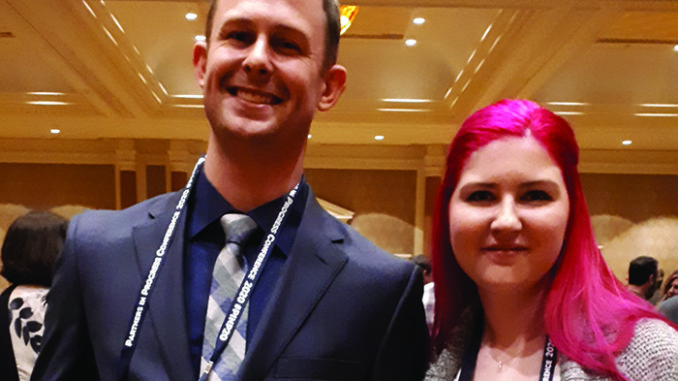
By / Natalie Bruckner
How do you attract the younger generation to the industry? Ask them!
“If you want to talk about how to get youth excited to enter the trade, the last person you want to ask is a 68-year-old man,” Bruce Sychuk, executive director of SMACNA-BC says. Sychuk recalls one presentation he was giving where he was asked the best way to bring women into the trade. His response? “I said, ‘Well, we have one in the audience, so why don’t we ask her?’ She gave an amazing off-the-cuff presentation. To get people to listen, you need someone who speaks the same language.”
Over the years the task force behind the Partners in Progress conference has increased its efforts to get younger people to attend, and this year they have really stepped up their game with the introduction of the Emerging Leaders Initiative.
In an effort to include the next generation of leaders in the 2022 Partners in Progress conference, SMACNA and SMART are giving local chapters and unions the opportunity to register two emerging leaders from their area (one labor and one management) to attend the conference by waiving their respective registration fees.
Selected emerging leaders need only meet the following criteria to have their registration fee waived: they must be under the age of 35; and they must have at least one or more current representative(s) from the local area or chapter registered to attend the conference. There is a strict limit of no more than one “future leader” from the labor side and one “future leader” from the management side registered per local union and chapter.
This is music to the ears of apprentices and young sheet metal leaders across North America. “Our generation can gain so much information from the conference that we wouldn’t otherwise hear. You learn a lot about how SMACNA and SMART work and what they are doing to keep the trade advancing and diversifying. You also get an inside look into what goes into keeping the trade as successful as it is and growing with the times. Plus, you meet a lot of people in the industry that you wouldn’t usually meet,” says Amy Lagendyk, third year apprentice with Local 280.
Lagendyk was chosen by her Local to attend the 2020 Partners in Progress conference in Las Vegas after her bosses and teachers heard great things about her: “The union thought I could represent well and benefit from attending,” she says.
And benefit she did. Lagendyk says that seeing behind the scenes has really helped her better understand the industry and feel more involved. “Some of the highlights for me were learning how involved women are in SMART and SMACNA and their locals; seeing how we are preparing for the future of the trade with upcoming technology and relationships; and getting to attend many informative seminars, such as Brent Darnell’s Promoting Women and Diversity in the Trades, Mentorship 101, and a seminar on mental health and substance issues, which is extremely important today.”
Tyler Crowder, fourth year apprentice with Summit Sheet Metal, agrees. Crowder attended the conference in Las Vegas and says that the conference increased his passion for the trade, and provided an invaluable experience. “The younger generation are the future of the union – it is essential to have young workers attend these conferences; it opens your eyes and makes you realize this union is not just us, it’s a giant group of people working together. It’s important to see how the leaders present themselves so we can use that as a benchmark for professionalism and to better understand the initiatives they are getting behind so we can expand our perspectives. Until the conference, I didn’t realize how much the older generation appreciates young workers – it’s reassuring to know we are in good hands,” he says.
For Crowder, being able to witness first-hand the scale and size of SMACNA and SMART coming together as one reinforced his decision to be part of a union. Also, witnessing the passion and drive to work on industry challenges, like the lack of minorities, gave him hope. “I was completely unaware of the problems and challenges being faced because I am exposed to fairness and equality where I work. It makes me proud to know we are doing the right thing.”
This attitude from those who will very soon by the leaders of the industry’s future is encouraging, but Crowder and Lagendyk represent only a tiny percentage of conference attendees.
“In 2018 I went to the Partners in Progress conference in Orlando and it was disappointing to see a lot of business agents, contractors, owners and EVPs of SMACNA, but no rank and file,” Gary Myers, VP marketing/business development at Intech Mechanical says. “We are missing an opportunity here. The conference is a great opportunity to bring rank and file, and contractors need to bring as many as they can so that we can ensure the success of the industry.”
So, what’s the challenge with getting younger people to attend? Cost has been cited as one challenge, but both Crowder and Lagendyk believe it is more than that. “More than cost, it’s getting the time off. Letting good employees take a week off for the conference can be hard, especially if there is a belief by some owners that the conference can be repetitive or that we won’t gain much value from it,” explains Lagendyk.
To overcome this challenge, Myers, who works closely with Local 104 to encourage emerging leaders in any way they can, sponsored two apprentices to attend the conference in Las Vegas . . .and paid for their three days while at the conference. “It is so worth it. It’s a real eye-opening opportunity for young leaders. One night we went to dinner and my apprentice Jeff Grill was sat next to our business agent – it was great for them to be able to have that conversation.”
Rick Werner, president/business manager at Local 104 agrees, adding, “It’s essential for our next generation of leaders to attend PIP to begin to network with both labor and management. It also allows leaders such as myself who have been in the industry for an entire career, to listen and understand what the concerns and ideas are of the next generation.”
Another challenge in getting younger people to the conference is perception, as Lagendyk explains: “Some bosses believe the conference can be repetitive, or don’t see much value in going and think we can gain more experience staying at work, but I gained a lot from it.”
In response Sychuk says this is where attending the conference shines, as it addresses perceptions and misconceptions. “When you’re in the union, you don’t always understand what’s going on in the trade. The most beneficial thing about the conference is people get to interact with others from areas across North America. It humanizes everyone. The conference is a great cross section of areas of chapters and locals who have really great progressive relationships, and some that aren’t as progressive. It’s great for emerging leaders to be exposed to this,” says Sychuk.
This is why for a number of years now Sychuk has worked closely with Local 280 to ensure a cross section of people get to attend the conference every year. SMACNA-BC brings six people from the management side and six from Local 280, and Local 280 and SMACNA-BC each sponsor an apprentice, bringing the total number of attendees to 14. “Usually you have one business manager and one business agent and four from the rank and file,” he says.
This collaborative approach works. Not only is SMACNA-BC and Local 280 relationship highly respected by peers, but Sychuk says that since doing this he has stopped having to put out so many fires.
Getting more youth involved through the Emerging Leaders Initiative can only be a good thing, and Crowder welcomes it with open arms saying: “I think this is a great idea; getting more people involved adds more layers of thinking and different perspectives.”
As for what these emerging leaders would love to see from the conference, well, let’s leave that for them to tell us.
“One thing that would be really cool would be a seminar on the history of sheet metal union. Being able to better understand the hardships that have been overcome would help people stay true to the union when times get tough. Hearing about the small things people have done that make a big differences is inspiring, and gets younger people interested in thinking of new ways to keep us moving forward. Knowing all the work people have put in to get us where we are today just makes me want to get involved so we can ensure the success of the industry for the next 50-plus years,” Crowder says. ■



